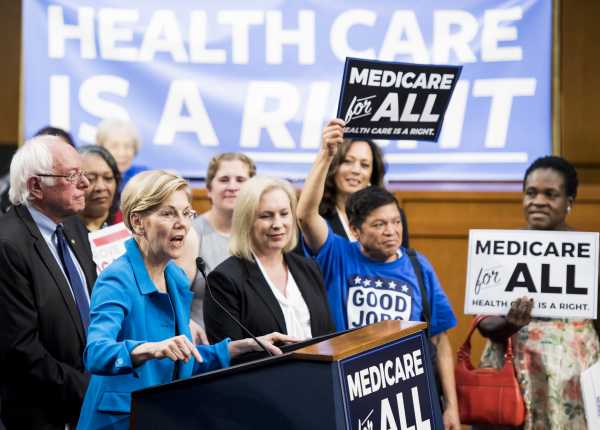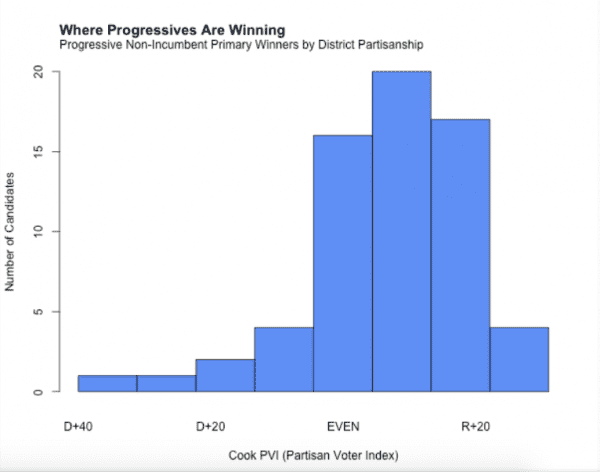
Progressive candidates are winning at a historic clip in Democratic House primaries so far in the 2018 midterm elections, according to new research released this week. But they haven’t quite taken the party over from the establishment just yet.
The left has scored some landmark wins this year: Alexandria Ocasio-Cortez toppled longtime Rep. Joe Crowley in New York this month, and Medicare-for-all-endorsing Kara Eastman defeated a centrist former Congress member in the Nebraska Second. But this new data paints a slightly more nuanced picture of their progress in remaking the Democratic Party.
The Brookings Institution’s Primaries Project, led by Elaine Kamarck, has analyzed 1,600 House and Senate candidates across nearly 600 Democratic primary elections. They found that this year an unprecedented number of self-identified progressive candidates are running for office: 280 nonincumbents in House primaries in the 31 states that have held primaries so far, up from a mere 60 in 2014.
They are winning more than ever too: 81 progressives have either won those Democratic House primaries or advanced to a runoff so far in 2018, versus just 24 six years ago and 31 in 2016.
This is in conjunction with a general surge in Democratic candidates: 681 non-incumbents have run this year, compared to 347 in 2014 and 371 in 2016. Progressives have also become a bigger share of the candidate pool in 2018, making up more than 40 percent of the nonincumbent candidates, versus 17 percent in 2014 and 26 percent in 2016.
But the progressive gains don’t quite equal a takeover of the Democratic Party. According to Brookings, 88 Democratic candidates they categorized as “establishment” have won House primaries so far in 2018 (30 percent of all establishment candidates), while 64 of the progressives have won (about 23 percent of all progressive candidates).
“For now their record is good but not great,” the Brookings researchers wrote.
The division between progressives and the Democratic establishment is still a meaningful distinction, particularly for the party’s marquee issue: health care. Brookings compiled the data on how many Democratic candidates are running on Medicare-for-all, a favored litmus test for the insurgent progressives.
They found that nearly half of all Democratic candidates have endorsed the idea, a reflection of the party’s leftward shift on health care. That is driven by the progressives, 71 percent of whom are backing Medicare-for-all. But on the other side, only 32 percent of the establishment candidates support the proposal.
Health care raises the question of definitions, too. Some establishment Democrats have sought to redefine Medicare-for-all, which originally signaled a single-payer health insurance program, into something more moderate and incremental.
The same uncertainty applies to even the definition of “progressive” — as the Brookings researchers pointed out, 14 progressive candidates have been named by the Democratic Congressional Campaign Committee on its Red-to-Blue list of battleground districts, which is “an establishment list if ever there was one.”
Still, the surge of self-identifying progressive and Medicare-for-all-endorsing candidates reflects real energy on the left, and those candidates have shown they are capable of winning primary elections even when the Democratic establishment has backed a different candidate.
Now they have to win the general election. Eastman in Nebraska and Katie Porter in the California 45th District beat out establishment-endorsed candidates in their primaries, and they now face Republican incumbents in toss-up districts. If Democrats are to retake the House in 2019, those are districts the party needs to win.
According to Brookings, some of these races may be out of reach for the left: A dozen or so progressive primary winners are running in heavily Republican districts and therefore would need more than a blue wave — more like a tsunami, Brookings said — to make it to Congress.
But a good number of progressives — upward of 40 — will be on the ballot in House districts that should be more competitive or tilt toward Democrats. That gives them a good shot of actually being elected to Congress, particularly if an anti-Trump environment proves to be an electoral boon for the minority party.

With those numbers, progressives would be in position to substantially shape the Democratic agenda in 2019. We’ve seen how the House Freedom Caucus, with about 40 members, has pushed the Republican Party to the right. If progressives can keep winning, they’ll have a chance to do the same.
“Progressive Democrats may not be winning a civil war inside the party,” the Brookings researchers wrote. “But, if and when Democrats have a chance at power again, progressives will have moved them on some pretty big issues.”
Sourse: vox.com






